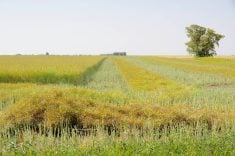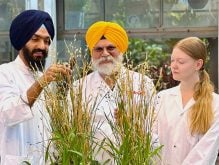National Farmers Union official says the federal government should consider new crop varieties on a case-by-case basis
In May, Health Canada decided that gene-edited foods are safe. As a result, gene-edited crops will be regulated similarly to conventionally bred crops unless the gene-editing includes foreign DNA.
The change opens the door to new crop varieties developed through gene editing, a technique where scientists can alter or delete the genes in a plant’s genome. Most farm groups in Canada support the Health Canada policy, saying it will speed innovation and deliver crops with desirable traits.
One group, the National Farmers Union, disagrees with Health Canada. The NFU says the safety of gene-edited crops is unknown and the technology should be highly regulated — with safety testing to show that new varieties of gene-edited crops are safe for humans and the environment.
Read Also

Agritechnica Day 2: The future of tractor power, building quicker crop apps and large farms and tech
Agritechnica Day 2: The future of tractor power, building quicker crop apps with Syngenta and large farms and tech
Stewart Wells, NFU second vice-president and a farmer from Swift Current, Sask., explained the organization’s position in an interview in June.
Q: Health Canada has said that gene-edited foods are safe and should be treated similarly to conventionally bred crops. What’s the NFU’s take on this? Are gene-edited crops unsafe?
A: I think it’s a little too early to make that determination. The default position would be… to say there should be a case-by-case evaluation of every new variety that’s developed (by) genetic modification or genome editing. To my knowledge, there are none or very few gene-edited foods out there. It makes it pretty hard to make a blanket statement on whether something is safe or unsafe when there is no track record…. There needs to be continuous monitoring, more rigourous science applied, more studies, more observation, just to make sure to not have negative ramifications for the future.
Q: Health Canada takes a “product-based” approach to regulations. It doesn’t regulate the process. In its guidance for plant breeding, Health Canada says, “the scientific basis underpinning a product-based regulatory system is that there has to be a hazard that people or the environment are exposed to for there to be a risk to consider or manage.” So, Health Canada says there’s nothing to regulate with gene-edited crops because there isn’t a risk. How do you respond to that?
A: They’re predicting that there aren’t going to be any hazards created. If you look at the work done by Michael Skinner, a professor at the University of Washington, and other scientists doing work into the epigenetic effects… handed down from generation to generation, you’re not able to predict, now, what are going to be the effects three or five or 10 generations from now. If you’re not able to identify that risk now…. (Health Canada) is going to proceed with the assumption that there’s not risk. (So) there’s no reason to regulate…. That Health Canada guideline talks about a 25-year history of genetic modification and how that is a long time. I would make the case that is a very, very short time. The genetic editing, the CRISPR–Cas9… they are still evolving (the process)…. Those scientists are just getting started…. My response is it’s very unwise to say there is no chance of any risk being created, so therefore we don’t need to regulate.
Q: Health Canada says 25 years of GM crops is long enough to prove that there isn’t a risk to humans or the environment. What is a reasonable window of time to evaluate the safety of gene-edited or GM crops?
A: My point of view is these technologies are so powerful, they’re creating plants and now animals that have never existed before on the planet. (So) they should all be evaluated on a case-by-case basis…. People would want the farmers union to say: well, if one GM product is OK and seems to be safe, then automatically all the rest of them is safe…. The NFU has never taken that position. We say it’s unwise and impossible to take the position (that) if one (GM crop) is good then they are all good and will forever be good, off into the future, regardless of how they’re developed or who develops them…. These new techniques, the gene editing, the CRISPR, they allow people to make changes anywhere in the genetic makeup of the plant. It’s looking like it’s an even more powerful tool than anything that’s existed in nature…. This is all new information. The question for me becomes, how do you make predictions off into the future about things that people are just learning now? It seems extremely unwise.
Q: One of the NFU’s arguments is that farmers may not benefit from gene-edited crops. But other groups, like the NFU in Britain, say there are potential benefits to growers. How do you explain the difference in opinions?
A: We can square that up pretty easily. The NFU in Canada does agree there’s tremendous potential in genetic modification. We’ve never said it shouldn’t happen, (or) that there should be a complete moratorium on it. We’re in agreement that there’s all kinds of positive potential for developing new varieties of plants that would have beneficial effects…. (But) there needs to continue to be proper regulation and proper monitoring of the process…. We don’t want to be looked at, four or five generations from now, with people saying, what were those people thinking about? Why didn’t they do a few more tests? Why didn’t they evaluate with independent science, instead of science that was corrupted by conflicts of interest?
Q: What about the risk vs. reward argument. When herbicide tolerant crops were first introduced, in the 1990s, it was suggested there was a risk. But what about the reward? Have Canadian farmers benefitted from GM crops, like herbicide tolerant crops?
A: If it turns out that the epigenetic effects are (a problem) for any of these herbicide resistance crops because they (promote) the use of the particular herbicide, if those effects turn out to be widespread and detrimental to the human population, then the resulting conclusion would be different…. Over the years our farm has used all sorts of chemicals that are (now) banned. My dad, for instance, used arsenic to kill grasshoppers. Arsenic is a heavy metal. A real serious contaminant…. If it turns out that using a lot of extra glyphosate is creating problems for future generations, then there’s going to be a different conclusion.
Q: If gene-edited crops are regulated like GM (transgenic) crops, then innovations and new plant traits may not get to market. Isn’t that a risk to farmers? Not getting crops with useful traits?
A: There’s no question that increased observation costs money…. The question becomes, do you want to make the mistake by spending too much money (up front) and avoiding problems? or do you want to save money now, on the hope that there will be no problems in the future?…. From the NFU point of view, we would want the government to spend more money… on independent, peer-reviewed research… even if takes longer to bring these things to the marketplace.
















